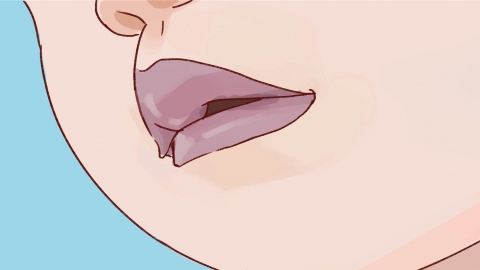How to treat purple lips to make them pink again
Generally, purple lips may be caused by cold exposure, excessive exercise, anemia, bronchial asthma, pneumonia, or other reasons. It is recommended to seek medical attention promptly and adopt general treatments, medications, and other methods under a doctor's guidance to improve the condition. A detailed explanation is as follows:

1. Cold Exposure
In cold environments, the body reduces heat loss by constricting peripheral blood vessels, including those in the lips. This leads to slower blood flow, increased oxygen consumption in tissues, and elevated levels of reduced hemoglobin, causing the lips to appear purple. During cold weather, it is important to stay warm, add clothing promptly, and wear masks as needed.
2. Excessive Exercise
After intense physical activity, oxygen consumption increases, and cardiac output may temporarily fail to meet demand, potentially causing relative hypoxia in areas such as the lips, resulting in a bluish discoloration. Exercise should be conducted gradually, avoiding sudden high-intensity exertion. Post-exercise relaxation activities should also be performed to allow the body to recover progressively.
3. Anemia
Anemia is often caused by deficiencies in hematopoietic raw materials or impaired hematopoietic function. In anemia, decreased hemoglobin levels reduce the blood's oxygen-carrying capacity, leading to insufficient oxygen supply to areas such as the lips, which may appear purple. Additional symptoms may include fatigue and palpitations. Patients may use medications such as ferrous sulfate tablets, ferrous fumarate granules, and methylcobalamin capsules under medical supervision to improve symptoms of purple lips.
4. Bronchial Asthma
Bronchial asthma is often related to genetic factors and allergens in the environment. During an asthma attack, airway spasms restrict ventilation, leading to insufficient oxygen intake and resulting in purple lips. Symptoms such as wheezing and shortness of breath may also occur. Patients may follow medical advice to use medications such as budesonide inhalation suspension, aminophylline sustained-release tablets, and montelukast sodium chewable tablets to help alleviate symptoms.
5. Pneumonia
Pneumonia is primarily caused by infection of the lungs by pathogens such as bacteria or viruses. Lung inflammation impairs gas exchange, preventing oxygen from effectively entering the bloodstream and hindering the removal of carbon dioxide, which may result in purple lips. Symptoms such as fever and cough may also be present. Under medical guidance, patients may use medications such as amoxicillin-clavulanate potassium granules, ribavirin granules, and oseltamivir phosphate granules to alleviate discomfort.
Routine health checkups should be performed regularly to detect hidden health issues early. Maintaining good indoor air circulation can also help reduce the risk of respiratory diseases.










